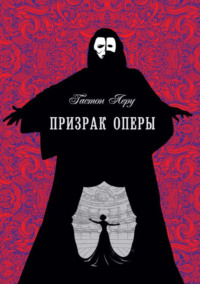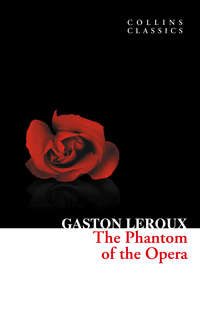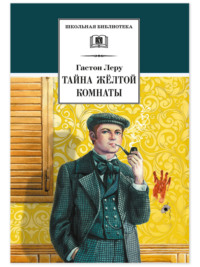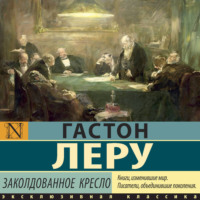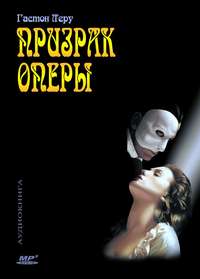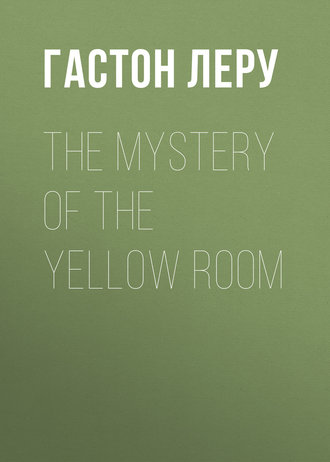 полная версия
полная версияThe Mystery of the Yellow Room
CHAPTER XVII. The Inexplicable Gallery
“Mademoiselle Stangerson appeared at the door of her ante-room,” continues Rouletabille’s note-book. “We were near her door in the gallery where this incredible phenomenon had taken place. There are moments when one feels as if one’s brain were about to burst. A bullet in the head, a fracture of the skull, the seat of reason shattered—with only these can I compare the sensation which exhausted and left me void of sense.
“Happily, Mademoiselle Stangerson appeared on the threshold of her ante-room. I saw her, and that helped to relieve my chaotic state of mind. I breathed her—I inhaled the perfume of the lady in black, whom I should never see again. I would have given ten years of my life—half my life—to see once more the lady in black! Alas! I no more meet her but from time to time,—and yet!—and yet! how the memory of that perfume—felt by me alone—carries me back to the days of my childhood.2 It was this sharp reminder from my beloved perfume, of the lady in black, which made me go to her—dressed wholly in white and so pale—so pale and so beautiful!—on the threshold of the inexplicable gallery. Her beautiful golden hair, gathered into a knot on the back of her neck, left visible the red star on her temple which had so nearly been the cause of her death. When I first got on the right track of the mystery of this case I had imagined that, on the night of the tragedy in “The Yellow Room”, Mademoiselle Stangerson had worn her hair in bands. But then, how could I have imagined otherwise when I had not been in The Yellow Room!
“But now, since the occurrence of the inexplicable gallery, I did not reason at all. I stood there, stupid, before the apparition—so pale and so beautiful—of Mademoiselle Stangerson. She was clad in a dressing-gown of dreamy white. One might have taken her to be a ghost—a lovely phantom. Her father took her in his arms and kissed her passionately, as if he had recovered her after being long lost to him. I dared not question her. He drew her into the room and we followed them,—for we had to know!—The door of the boudoir was open. The terrified faces of the two nurses craned towards us. Mademoiselle Stangerson inquired the meaning of all the disturbance. That she was not in her own room was quite easily explained—quite easily. She had a fancy not to sleep that night in her chamber, but in the boudoir with her nurses, locking the door on them. Since the night of the crime she had experienced feelings of terror, and fears came over her that are easily to be comprehended.
“But who could imagine that on that particular night when he was to come, she would, by a mere chance, determine to shut herself in with her women? Who would think that she would act contrary to her father’s wish to sleep in the drawing-room? Who could believe that the letter which had so recently been on the table in her room would no longer be there? He who could understand all this, would have to assume that Mademoiselle Stangerson knew that the murderer was coming—she could not prevent his coming again—unknown to her father, unknown to all but to Monsieur Robert Darzac. For he must know it now—perhaps he had known it before! Did he remember that phrase in the Elysee garden: ‘Must I commit a crime, then, to win you?’ Against whom the crime, if not against the obstacle, against the murderer? ‘Ah, I would kill him with my own hand!’ And I replied, ‘You have not answered my question.’ That was the very truth. In truth, in truth, Monsieur Darzac knew the murderer so well that—while wishing to kill him himself—he was afraid I should find him. There could be but two reasons why he had assisted me in my investigation. First, because I forced him to do it; and, second, because she would be the better protected.
“I am in the chamber—her room. I look at her, also at the place where the letter had just now been. She has possessed herself of it; it was evidently intended for her—evidently. How she trembles!—Trembles at the strange story her father is telling her, of the presence of the murderer in her chamber, and of the pursuit. But it is plainly to be seen that she is not wholly satisfied by the assurance given her until she had been told that the murderer, by some incomprehensible means, had been able to elude us.
“Then follows a silence. What a silence! We are all there—looking at her—her father, Larsan, Daddy Jacques and I. What were we all thinking of in the silence? After the events of that night, of the mystery of the inexplicable gallery, of the prodigious fact of the presence of the murderer in her room, it seemed to me that all our thoughts might have been translated into the words which were addressed to her. ‘You who know of this mystery, explain it to us, and we shall perhaps be able to save you. How I longed to save her—for herself, and, from the other!—It brought the tears to my eyes.
“She is there, shedding about her the perfume of the lady in black. At last, I see her, in the silence of her chamber. Since the fatal hour of the mystery of “The Yellow Room”, we have hung about this invisible and silent woman to learn what she knows. Our desires, our wish to know must be a torment to her. Who can tell that, should we learn the secret of her mystery, it would not precipitate a tragedy more terrible than that which had already been enacted here? Who can tell if it might not mean her death? Yet it had brought her close to death,—and we still knew nothing. Or, rather, there are some of us who know nothing. But I—if I knew who, I should know all. Who?—Who?—Not knowing who, I must remain silent, out of pity for her. For there is no doubt that she knows how he escaped from “The Yellow Room”, and yet she keeps the secret. When I know who, I will speak to him—to him!”
“She looked at us now—with a far-away look in her eyes—as if we were not in the chamber. Monsieur Stangerson broke the silence. He declared that, henceforth, he would no more absent himself from his daughter’s apartments. She tried to oppose him in vain. He adhered firmly to his purpose. He would install himself there this very night, he said. Solely concerned for the health of his daughter, he reproached her for having left her bed. Then he suddenly began talking to her as if she were a little child. He smiled at her and seemed not to know either what he said or what he did. The illustrious professor had lost his head. Mademoiselle Stangerson in a tone of tender distress said: ‘Father!—father!’ Daddy Jacques blows his nose, and Frederic Larsan himself is obliged to turn away to hide his emotion. For myself, I am able neither to think or feel. I felt an infinite contempt for myself.
“It was the first time that Frederic Larsan, like myself, found himself face to face with Mademoiselle Stangerson since the attack in The Yellow Room. Like me, he had insisted on being allowed to question the unhappy lady; but he had not, any more than had I, been permitted. To him, as to me, the same answer had always been given: Mademoiselle Stangerson was too weak to receive us. The questionings of the examining magistrate had over-fatigued her. It was evidently intended not to give us any assistance in our researches. I was not surprised; but Frederic Larsan had always resented this conduct. It is true that he and I had a totally different theory of the crime.
“I still catch myself repeating from the depths of my heart: ‘Save her!—save her without his speaking!’ Who is he—the murderer? Take him and shut his mouth. But Monsieur Darzac made it clear that in order to shut his mouth he must be killed. Have I the right to kill Mademoiselle Stangerson’s murderer? No, I had not. But let him only give me the chance! Let me find out whether he is really a creature of flesh and blood!—Let me see his dead body, since it cannot be taken alive.
“If I could but make this woman, who does not even look at us, understand! She is absorbed by her fears and by her father’s distress of mind. And I can do nothing to save her. Yes, I will go to work once more and accomplish wonders.
“I move towards her. I would speak to her. I would entreat her to have confidence in me. I would, in a word, make her understand—she alone—that I know how the murderer escaped from “The Yellow Room”—that I have guessed the motives for her secrecy—and that I pity her with all my heart. But by her gestures she begged us to leave her alone, expressing weariness and the need for immediate rest. Monsieur Stangerson asked us to go back to our rooms and thanked us. Frederic Larsan and I bowed to him and, followed by Daddy Jacques, we regained the gallery. I heard Larsan murmur: ‘Strange! strange!’ He made a sign to me to go with him into his room. On the threshold he turned towards Daddy Jacques.
“‘Did you see him distinctly?’ he asked.
“‘Who?’
“‘The man?’
“‘Saw him!—why, he had a big red beard and red hair.’
“‘That’s how he appeared to me,’ I said.
“‘And to me,’ said Larsan.
“The great Fred and I were alone in his chamber, now, to talk over this thing. We talked for an hour, turning the matter over and viewing it from every side. From the questions put by him, from the explanation which he gives me, it is clear to me that—in spite of all our senses—he is persuaded the man disappeared by some secret passage in the chateau known to him alone.
“‘He knows the chateau,’ he said to me; ‘he knows it well.’
“‘He is a rather tall man—well-built,’ I suggested.
“‘He is as tall as he wants to be,’ murmured Fred.
“‘I understand,’ I said; ‘but how do you account for his red hair and beard?’
“‘Too much beard—too much hair—false,’ says Fred.
“‘That’s easily said. You are always thinking of Robert Darzac. You can’t get rid of that idea? I am certain that he is innocent.’
“‘So much the better. I hope so; but everything condemns him. Did you notice the marks on the carpet?—Come and look at them.’
“‘I have seen them; they are the marks of the neat boots, the same as those we saw on the border of the lake.’
“‘Can you deny that they belong to Robert Darzac?’
“‘Of course, one may be mistaken.’
“‘Have you noticed that those footprints only go in one direction?—that there are no return marks? When the man came from the chamber, pursued by all of us, his footsteps left no traces behind them.’
“‘He had, perhaps, been in the chamber for hours. The mud from his boots had dried, and he moved with such rapidity on the points of his toes—We saw him running, but we did not hear his steps.’
“I suddenly put an end to this idle chatter—void of any logic, and made a sign to Larsan to listen.
“‘There—below; some one is shutting a door.’
“I rise; Larsan follows me; we descend to the ground-floor of the chateau. I lead him to the little semi-circular room under the terrace beneath the window of the ‘off-turning’ gallery. I point to the door, now closed, open a short time before, under which a shaft of light is visible.
“‘The forest-keeper!’ says Fred.
“‘Come on!’ I whisper.
“Prepared—I know not why—to believe that the keeper is the guilty man—I go to the door and rap smartly on it. Some might think that we were rather late in thinking of the keeper, since our first business, after having found that the murderer had escaped us in the gallery, ought to have been to search everywhere else,—around the chateau,—in the park—
“Had this criticism been made at the time, we could only have answered that the assassin had disappeared from the gallery in such a way that we thought he was no longer anywhere! He had eluded us when we all had our hands stretched out ready to seize him—when we were almost touching him. We had no longer any ground for hoping that we could clear up the mystery of that night.
“As soon as I rapped at the door it was opened, and the keeper asked us quietly what we wanted. He was undressed and preparing to go to bed. The bed had not yet been disturbed.
“We entered and I affected surprise.
“‘Not gone to bed yet?’
“‘No,’ he replied roughly. ‘I have been making a round of the park and in the woods. I am only just back—and sleepy. Good-night!’
“‘Listen,’ I said. ‘An hour or so ago, there was a ladder close by your window.’
“‘What ladder?—I did not see any ladder. Good-night!’
“And he simply put us out of the room. When we were outside I looked at Larsan. His face was impenetrable.
“‘Well?’ I said.
“‘Well?’ he repeated.
“‘Does that open out any new view to you?’
“There was no mistaking Larsan’s bad temper. On re-entering the chateau, I heard him mutter:
“‘It would be strange—very strange—if I had deceived myself on that point!’
“He seemed to be talking to me rather than to himself. He added: ‘In any case, we shall soon know what to think. The morning will bring light with it.’”
CHAPTER XVIII. Rouletabille Has Drawn a Circle Between the Two Bumps on His Forehead
(EXTRACT FROM THE NOTE-BOOK OF JOSEPH ROULETABILLE, continued)“We separated on the thresholds of our rooms, with a melancholy shake of the hands. I was glad to have aroused in him a suspicion of error. His was an original brain, very intelligent but—without method. I did not go to bed. I awaited the coming of daylight and then went down to the front of the chateau, and made a detour, examining every trace of footsteps coming towards it or going from it. These, however, were so mixed and confusing that I could make nothing of them. Here I may make a remark,—I am not accustomed to attach an exaggerated importance to exterior signs left in the track of a crime.
“The method which traces the criminal by means of the tracks of his footsteps is altogether primitive. So many footprints are identical. However, in the disturbed state of my mind, I did go into the deserted court and did look at all the footprints I could find there, seeking for some indication, as a basis for reasoning.
“If I could but find a right starting-point! In despair I seated myself on a stone. For over an hour I busied myself with the common, ordinary work of a policeman. Like the least intelligent of detectives I went on blindly over the traces of footprints which told me just no more than they could.
“I came to the conclusion that I was a fool, lower in the scale of intelligence than even the police of the modern romancer. Novelists build mountains of stupidity out of a footprint on the sand, or from an impression of a hand on the wall. That’s the way innocent men are brought to prison. It might convince an examining magistrate or the head of a detective department, but it’s not proof. You writers forget that what the senses furnish is not proof. If I am taking cognisance of what is offered me by my senses I do so but to bring the results within the circle of my reason. That circle may be the most circumscribed, but if it is, it has this advantage—it holds nothing but the truth! Yes, I swear that I have never used the evidence of the senses but as servants to my reason. I have never permitted them to become my master. They have not made of me that monstrous thing,—worse than a blind man,—a man who sees falsely. And that is why I can triumph over your error and your merely animal intelligence, Frederic Larsan.
“Be of good courage, then, friend Rouletabille; it is impossible that the incident of the inexplicable gallery should be outside the circle of your reason. You know that! Then have faith and take thought with yourself and forget not that you took hold of the right end when you drew that circle in your brain within which to unravel this mysterious play of circumstance.
“To it, once again! Go—back to the gallery. Take your stand on your reason and rest there as Frederic Larsan rests on his cane. You will then soon prove that the great Fred is nothing but a fool.
–30th October. Noon.
JOSEPH ROULETABILLE.”
“I acted as I planned. With head on fire, I retraced my way to the gallery, and without having found anything more than I had seen on the previous night, the right hold I had taken of my reason drew me to something so important that I was obliged to cling to it to save myself from falling.
“Now for the strength and patience to find sensible traces to fit in with my thinking—and these must come within the circle I have drawn between the two bumps on my forehead!
–30th of October. Midnight.”
“JOSEPH ROULETABILLE.”
CHAPTER XIX. Rouletabille Invites Me to Breakfast at the Donjon Inn
It was not until later that Rouletabille sent me the note-book in which he had written at length the story of the phenomenon of the inexplicable gallery. On the day I arrived at the Glandier and joined him in his room, he recounted to me, with the greatest detail, all that I have now related, telling me also how he had spent several hours in Paris where he had learned nothing that could be of any help to him.
The event of the inexplicable gallery had occurred on the night between the 29th and 30th of October, that is to say, three days before my return to the chateau. It was on the 2nd of November, then, that I went back to the Glandier, summoned there by my friend’s telegram, and taking the revolvers with me.
I am now in Rouletabille’s room and he has finished his recital.
While he had been telling me the story I noticed him continually rubbing the glass of the eyeglasses he had found on the side table. From the evident pleasure he was taking in handling them I felt they must be one of those sensible evidences destined to enter what he had called the circle of the right end of his reason. That strange and unique way of his, to express himself in terms wonderfully adequate for his thoughts, no longer surprised me. It was often necessary to know his thought to understand the terms he used; and it was not easy to penetrate into Rouletabille’s thinking.
This lad’s brain was one of the most curious things I have ever observed. Rouletabille went on the even tenor of his way without suspecting the astonishment and even bewilderment he roused in others. I am sure he was not himself in the least conscious of the originality of his genius. He was himself and at ease wherever he happened to be.
When he had finished his recital he asked me what I thought of it. I replied that I was much puzzled by his question. Then he begged me to try, in my turn, to take my reason in hand “by the right end.”
“Very well,” I said. “It seems to me that the point of departure of my reason would be this—there can be no doubt that the murderer you pursued was in the gallery.” I paused.
“After making so good a start, you ought not to stop so soon,” he exclaimed. “Come, make another effort.”
“I’ll try. Since he disappeared from the gallery without passing through any door or window, he must have escaped by some other opening.”
Rouletabille looked at me pityingly, smiled carelessly, and remarked that I was reasoning like a postman, or—like Frederic Larsan.
Rouletabille had alternate fits of admiration and disdain for the great Fred. It all depended as to whether Larsan’s discoveries tallied with Rouletabille’s reasoning or not. When they did he would exclaim: “He is really great!” When they did not he would grunt and mutter, “What an ass!” It was a petty side of the noble character of this strange youth.
We had risen, and he led me into the park. When we reached the court and were making towards the gate, the sound of blinds thrown back against the wall made us turn our heads, and we saw, at a window on the first floor of the chateau, the ruddy and clean shaven face of a person I did not recognise.
“Hullo!” muttered Rouletabille. “Arthur Rance!”—He lowered his head, quickened his pace, and I heard him ask himself between his teeth: “Was he in the chateau that night? What is he doing here?”
We had gone some distance from the chateau when I asked him who this Arthur Rance was, and how he had come to know him. He referred to his story of that morning and I remembered that Mr. Arthur W. Rance was the American from Philadelphia with whom he had had so many drinks at the Elysee reception.
“But was he not to have left France almost immediately?” I asked.
“No doubt; that’s why I am surprised to find him here still, and not only in France, but above all, at the Glandier. He did not arrive this morning; and he did not get here last night. He must have got here before dinner, then. Why didn’t the concierges tell me?”
I reminded my friend, apropos of the concierges, that he had not yet told me what had led him to get them set at liberty.
We were close to their lodge. Monsieur and Madame Bernier saw us coming. A frank smile lit up their happy faces. They seemed to harbour no ill-feeling because of their detention. My young friend asked them at what hour Mr. Arthur Rance had arrived. They answered that they did not know he was at the chateau. He must have come during the evening of the previous night, but they had not had to open the gate for him, because, being a great walker, and not wishing that a carriage should be sent to meet him, he was accustomed to get off at the little hamlet of Saint-Michel, from which he came to the chateau by way of the forest. He reached the park by the grotto of Sainte-Genevieve, over the little gate of which, giving on to the park, he climbed.
As the concierges spoke, I saw Rouletabille’s face cloud over and exhibit disappointment—a disappointment, no doubt, with himself. Evidently he was a little vexed, after having worked so much on the spot, with so minute a study of the people and events at the Glandier, that he had to learn now that Arthur Rance was accustomed to visit the chateau.
“You say that Monsieur Arthur Rance is accustomed to come to the chateau. When did he come here last?”
“We can’t tell you exactly,” replied Madame Bernier—that was the name of the concierge—“we couldn’t know while they were keeping us in prison. Besides, as the gentleman comes to the chateau without passing through our gate he goes away by the way he comes.”
“Do you know when he came the first time?”
“Oh yes, Monsieur!—nine years ago.”
“He was in France nine years ago, then,” said Rouletabille, “and, since that time, as far as you know, how many times has he been at the Glandier?”
“Three times.”
“When did he come the last time, as far as you know?”
“A week before the attempt in “The Yellow Room”.”
Rouletabille put another question—this time addressing himself particularly to the woman:
“In the grove of the parquet?”
“In the grove of the parquet,” she replied.
“Thanks!” said Rouletabille. “Be ready for me this evening.”
He spoke the last words with a finger on his lips as if to command silence and discretion.
We left the park and took the way to the Donjon Inn.
“Do you often eat here?”
“Sometimes.”
“But you also take your meals at the chateau?”
“Yes, Larsan and I are sometimes served in one of our rooms.”
“Hasn’t Monsieur Stangerson ever invited you to his own table?”
“Never.”
“Does your presence at the chateau displease him?”
“I don’t know; but, in any case, he does not make us feel that we are in his way.”
“Doesn’t he question you?”
“Never. He is in the same state of mind as he was in at the door of The Yellow Room when his daughter was being murdered, and when he broke open the door and did not find the murderer. He is persuaded, since he could discover nothing, that there’s no reason why we should be able to discover more than he did. But he has made it his duty, since Larsan expressed his theory, not to oppose us.”
Rouletabille buried himself in thought again for some time. He aroused himself later to tell me of how he came to set the two concierges free.
“I went recently to see Monsieur Stangerson, and took with me a piece of paper on which was written: ‘I promise, whatever others may say, to keep in my service my two faithful servants, Bernier and his wife.’ I explained to him that, by signing that document, he would enable me to compel those two people to speak out; and I declared my own assurance of their innocence of any part in the crime. That was also his opinion. The examining magistrate, after it was signed, presented the document to the Berniers, who then did speak. They said, what I was certain they would say, as soon as they were sure they would not lose their place.
“They confessed to poaching on Monsieur Stangerson’s estates, and it was while they were poaching, on the night of the crime, that they were found not far from the pavilion at the moment when the outrage was being committed. Some rabbits they caught in that way were sold by them to the landlord of the Donjon Inn, who served them to his customers, or sent them to Paris. That was the truth, as I had guessed from the first. Do you remember what I said, on entering the Donjon Inn?—‘We shall have to eat red meat—now!’ I had heard the words on the same morning when we arrived at the park gate. You heard them also, but you did not attach any importance to them. You recollect, when we reached the park gate, that we stopped to look at a man who was running by the side of the wall, looking every minute at his watch. That was Larsan. Well, behind us the landlord of the Donjon Inn, standing on his doorstep, said to someone inside: ‘We shall have to eat red meat—now.’





